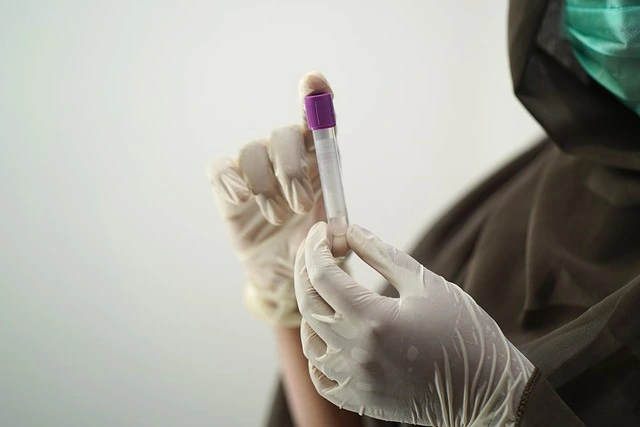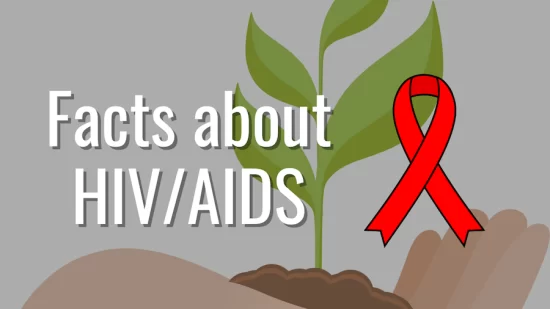Table of Contents
- Difference between HIV and AIDS
- Is there any cure for HIV/AIDS?
- Early Signs and Symptoms of HIV
- How doctor identifies HIV status?
- What does Undetectable mean for HIV Patient?
- How does HIV transmission occur?
- How to stop HIV transmission?
- What else is possible when dealing with HIV?
- Ways to prevent from HIV Infection
- How to deal with HIV?
HIV and AIDS are one of the most known terms around the world. Two things that make it such a popular term are It cannot be cured and the second thing is most of the transmission happens sexually. Sexual transmission is the reason why it is a taboo topic among people. Unfortunately, that also means it is not discussed openly and thus people don’t know much about it. In this wellness article of Facts, we will try to spread the reality of HIV, and AIDS and uncover the taboo it.
HIV and AIDS are very serious topics and we understand that. Thus all the facts are backed with evidence don’t forget to check credible references and source sections. The information is for educational and informational purposes, and doctor’s recommendations should always be followed.
Difference between HIV and AIDS
HIV stands for Human Immunodeficiency Virus and AIDS stands for Acquired Immune Deficiency syndrome. The difference between them is that HIV is a virus that attacks the Immune system of a human. The immune system is responsible to keep you away from any illness. When this virus gets into the body it uses immune cells to multiply and over time it damages the immune cells so that they become weak and can’t fight infections.
While AIDS is a condition in which the immune system is severely damaged. AIDS occurs when HIV infection is left untreated.
Is there any cure for HIV/AIDS?
Although we have heard few cases in which HIV is fully cured but those are extraordinary cases. For most people, there is no cure for the HIV virus. After getting into the body, it keeps generating multiple copies of the virus along with mutation in the virus itself.
So as of now, it is sad to say that viruses will always be there in the body as there is no such cure. But by taking proper medication we can stop the virus from multiplying which will also make the immune system stronger to keep us healthy. So even after having HIV, you can live a normal life like anyone else.
Early Signs and Symptoms of HIV
Within 2 to 4 weeks of HIV exposure, more than 60% of people go through a flu-like sickness. The symptoms are similar to any flu
- Fever
- Muscles aches
- Sore throat
- Night sweat
- Fatigue
- Mouth ulcers
- Swollen lymph nodes
- Rashes
- Chills
Since all the symptoms are very common that does not mean whenever you get these symptoms you should check for HIV. Also, note that many people don’t even get any symptoms at this stage.
Instead, if you encounter any situation that could possibly lead to exposure to HIV you should not keep a single doubt in your mind and go for an HIV test. The earlier the better.
How doctor identifies HIV status?
The doctor identifies the HIV status of a patient with a Blood test. With each blood test, a doctor can get to know the HIV count in the blood. The count of HIV in the blood is also called Viral load.
The HIV medicines that are usually taken every day can completely restrict the HIV virus from multiplying which means over the course of time, there will be less and less HIV virus in the blood that will become undetectable with a blood test. This condition is called Undetectable and as of now is the best situation for any HIV patient.
What does Undetectable mean for HIV Patient?

Undetectable is a situation which means the HIV virus is not detectable with the blood test and this happens when you are regular with your medicines. HIV never goes away from the body so if you stop taking medicines, the virus will become resistant to drugs and drugs will not work any more.
Undetectable also means that your immune system will become stronger, and you will not pass any HIV virus to others in unprotected sex. But if aren’t sure condoms are the safest way to prevent any STDs.
The risk of transmission of the virus through a syringe and the needle also gets reduced but to what extent is still unclear.
How does HIV transmission occur?
HIV is found in various body fluids such as blood, semen, vaginal fluid, breast milk, and anal fluid. Thus the transmission of HIV can occur when any of these transmission fluids get into the body of another person.
HIV is not transmitted through saliva so kissing is fine.
Common ways of transmission are through unprotected sex vaginal or anal, and through sharing medical equipment such as syringes, needles, spoons etc.
Pregnant women can also pass the HIV virus to the baby during pregnancy, birth or breast feeding.
How to stop HIV transmission?
HIV transmission starts with taking proper medicines every day on time. This will make the virus eventually undetectable. Until the virus is undetectable, using condoms for sex is the safest way to prevent virus transmission.
Avoid using needles and syringes for any purpose and stay away from them, you never know if they could have a deadly virus in them.
HIV virus when comes in contact with air or light dies and loses its ability to infect. Although it is always recommendable to avoid sharing any personal hygiene equipment with others.
If you are an HIV patient, talk to the doctor if you are having a baby or planning to have one. There are various medications available that can reduce the risk of HIV transmission to as little as 1%.
What else is possible when dealing with HIV?
There are always a lot of questions about what else is safe. Although we cannot cover all the things as we don’t know what you would want to ask. It is safe to say that except for sexual contact and contact with blood or other transmission fluid, everything else is safe.
Sharing food, drink or smoke is fine. Kissing or hugging someone with HIV is also safe. Coughing, sneezing or mosquito bites also cannot spread HIV. Sharing toilets or bathrooms will also not cause any problems.
Ways to prevent from HIV Infection
Science has progressed a lot in the case of the prevention of HIV. Here are the ways you can prevent yourself from the infection.
Use Condoms
Condom is one of the safest and easiest ways to prevent any STDs (Sexual transmission diseases) not just HIV. It also helps in eliminating the risk of Pregnancy if you are not looking for a baby with a sex partner. A single wrong encounter can change your life upside down so always prioritize safety before pleasure.
Use PrEP (Pre-Exposure Prophylaxis)
PrEP is a helpful drug for any HIV-negative who believes they are at high risk of exposure to HIV. So when you are really exposed to HIV and have already taken the drug, the drug will reduce the risk of infection from the virus. Basically, this has to be taken before the exposure.
Use PEP (Post-Exposure Prophylaxis)
PEP is another prevention method for HIV-negative after they believe they are exposed to the HIV virus. This need to start as soon as after the exposure, mostly within 72 hours of the exposure. But prevention is always better similarly PrEP is considered a better prevention strategy.
How to deal with HIV?
If you are detected with HIV don’t worry you are not alone. But here are few things you should keep in mind
- Medication everyday on time – Always take your medication on time as it will restrict HIV virus from growing and make your immune system stronger.
- Stay in Contact with Doctor – The doctor will be your best friend so always consult your doctor to monitor your immune system health and your HIV level in the blood and body with a periodic blood tests.
- Eat Healthily, and Do exercise.
By following this regime you can live as normal life as any other individual on planet.
Did you like the Facts about HIV / AIDS? Follow us on Instagram at @conceptdive and make your social feed more interesting.














